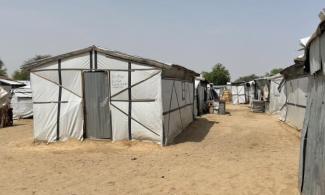
Babagana Zulum, governor of Borno, said in October 2021 that all government-run IDP camps in Maiduguri would be closed by December 31, 2021.
No fewer than 200,000 people have been driven to abject poverty after the closure of internally displaced people (IDPs) camps, according to a report published by Human Rights Watch (HRW) on Wednesday.
The international non-governmental organisation said the IDPs are currently facing extreme starvation, a lack of shelter, and instability because of the camps closures which have denied them access to humanitarian aids.
Borno is one of Nigeria's north-eastern states most hit by the Boko Haram conflict.
Babagana Zulum, governor of Borno, said in October 2021 that all government-run IDP camps in Maiduguri would be closed by December 31, 2021.
Zulum had claimed that the decision was influenced by the improvement in the security situation in IDP settlements.
Meanwhile, Human Rights Watch (HRW) report disclosed that the government had failed to provide the basic needs for the internally displaced persons after moving them away from the camps.
The report reads in part: “The decision by Nigeria’s Borno State to shut down its camps for people displaced by the Boko Haram conflict has pushed over 200,000 people into deeper suffering and destitution
“Borno State is harming hundreds of thousands of displaced people already living in precarious conditions to advance a dubious agenda to wean people off humanitarian aid.
“Borno State authorities should stop closing camps until the authorities have had genuine consultations with the camp residents and other key actors and made adequate plans for them to resume their lives and livelihoods.
“The decision by Nigeria’s Borno State government to shut down its camps for people displaced by the Boko Haram conflict has pushed over 200,000 people into deeper suffering and destitution, Human Rights Watch said in a report released today. The government has not provided those removed with adequate alternatives, violating their rights to housing, food, and livelihoods.
The 59-page report, “‘Those Who Returned Are Suffering’: Impact of Camp Shutdowns on People Displaced by the Boko Haram Conflict in Nigeria,” also unearhed how the closure of the camps has disrupted food support for internally displaced people and compelled them to leave the camps. The authorities have failed to provide adequate information or sustainable alternatives to ensure their safety and well-being. As a result, displaced people are struggling to meet their most basic needs including food and shelter in the places to which they have returned or where they have resettled.
“The Borno State government is harming hundreds of thousands of displaced people already living in precarious conditions to advance a dubious government development agenda to wean people off humanitarian aid,” said Anietie Ewang, Nigeria researcher at Human Rights Watch and author of the report. “By forcing people from camps without creating viable alternatives for support, the government is worsening their suffering and deepening their vulnerability.”
“The people affected by camp closures are also living in worse accommodations than they had in the camps. While in the camps, many had lived in tarpaulin tents set up by humanitarian organizations or occupied single rooms in houses built on the premises before they became camp sites. The structures outside the camps seen by Human Rights Watch were poorly built, providing little shelter from the rain. The makeshift thatch structures in Maiduguri and Bama had no access to sanitation facilities, relying on pit latrines separate from their homes.”
It was also learned that the Borno State government claimed to have repaired houses in areas where they had pushed displaced residents to return, such as Bama, that had been damaged during the fight with Boko Haram. However, some who returned stated their homes had not been repaired.
“Human Rights Watch urged the UN, especially its representatives in Nigeria, to respond more actively and effectively to prevent and mitigate harm to displaced people in Borno State, rather than waiting for a more disastrous outcome to emerge. Borno State authorities should suspend the closure of the remaining camps until adequate plans and genuine consultations are made with the camp residents and other key actors.
“Nigerian authorities should recognize that hasty closure of camps is sabotaging efforts to improve the lives of displaced people,” Ewang said. “Anything short of investment in collective efforts with aid providers to ensure durable and dignified solutions for displaced people will be a step in the wrong direction,” the report added.